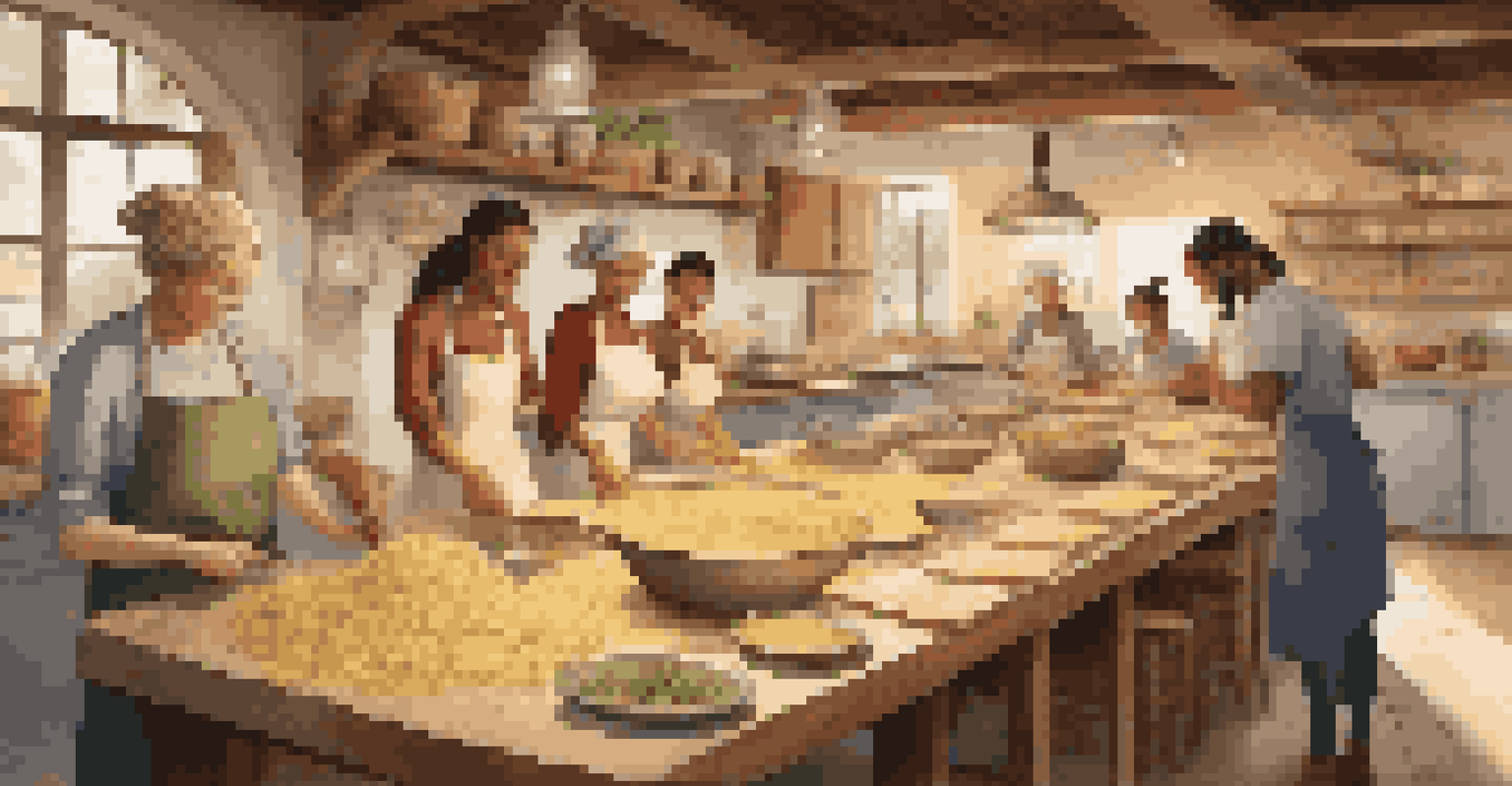Connecting Through Food: Engaging with Local Culinary Cultures

The Universal Language of Food: Bridging Cultural Divides
Food has an incredible power to unite people across different backgrounds. No matter where you go in the world, sharing a meal often breaks down barriers and creates bonds. Think about a family dinner or a potluck; it’s a chance for everyone to come together, share stories, and enjoy each other’s company.
Food is our common ground, a universal experience.
When you travel to a new place, trying local dishes can be a window into that culture. Whether it’s the spices used in Indian curry or the simplicity of an Italian pasta dish, every bite tells a story. This experience not only satisfies your palate but also enriches your understanding of the local way of life.
Engaging with culinary traditions allows you to connect with communities on a deeper level. By participating in local food festivals or cooking classes, you gain insights into the history and values that shape a culture. Ultimately, food is more than sustenance; it’s a celebration of identity and shared heritage.
Exploring Traditional Recipes: A Taste of History
Every traditional recipe carries a piece of history, often passed down through generations. These recipes reflect the ingredients that are locally available and the unique cooking methods developed over time. For instance, the art of making sushi in Japan not only focuses on the flavors but also on the meticulous techniques that have been refined for centuries.

By cooking traditional dishes, you can experience a slice of history firsthand. Imagine preparing a classic French coq au vin or an authentic Mexican mole; you’re not just following a recipe, you’re engaging with the culture’s past. This practice fosters a sense of connection to the people who came before us, their struggles, and their triumphs.
Food Unites Across Cultures
Sharing meals creates bonds and fosters understanding among diverse communities.
Also, sharing these recipes can help keep cultural traditions alive. When you invite friends and family to share a meal made from a beloved family recipe, you’re not just feeding them; you’re telling a story. This culinary storytelling can spark curiosity about different cultures and inspire a greater appreciation for diversity.
Food Festivals: Celebrating Culinary Heritage Together
Food festivals are a fantastic way to engage with local culinary cultures. These vibrant gatherings showcase a variety of dishes, allowing you to sample flavors from different regions all in one place. Whether it’s a celebration of street food, regional specialties, or seasonal produce, these events create a lively atmosphere for food lovers to explore.
Cooking is like love. It should be entered into with abandon or not at all.
Attending a food festival is like taking a mini-vacation for your taste buds. You can meet local chefs, learn about their cooking techniques, and even participate in workshops. It’s an opportunity to celebrate diversity while enjoying the flavors that define a community’s identity.
Moreover, food festivals often include cultural performances, art displays, and cooking demonstrations, making them a holistic experience. This immersive environment encourages conversations between locals and visitors, fostering mutual respect and understanding. As you savor the dishes, you also develop a deeper appreciation for the stories behind them.
Cooking Classes: Hands-On Learning About Local Flavors
Participating in a cooking class is a hands-on way to dive into local culinary traditions. These classes often reveal the secrets behind beloved dishes, allowing you to replicate the flavors at home. Imagine learning to make fresh pasta with an Italian nonna or mastering the art of sushi rolling in Japan; it’s an experience you won’t forget.
Beyond just learning recipes, cooking classes often include insights into the cultural significance of the dishes. In many cultures, food preparation is a communal activity that fosters relationships. By engaging in this practice, you connect with the community and the values they hold dear.
Traditional Recipes Tell Stories
Every traditional dish connects us to history and the cultural values of past generations.
Additionally, cooking classes can be a great way to meet new people and make friends from different backgrounds. As you chop, sauté, and taste together, you share laughter and stories, creating memories that last long after the meal is over. This communal aspect of cooking reinforces the idea that food is a connector, bringing people together in meaningful ways.
Street Food: A Window into Everyday Life
Street food offers a unique glimpse into the everyday lives of locals. It’s often affordable, accessible, and bursting with flavor, reflecting the preferences and traditions of the community. Strolling through a market and sampling dishes from various stalls gives you an authentic taste of local culture.
These casual eateries often serve up dishes that have been perfected over generations. Take the time to chat with vendors; they usually have captivating stories about their recipes and the history behind them. This interaction not only enhances your culinary experience but also builds a connection with the people who make the food.
Moreover, trying street food can be an adventure in itself. From the thrill of discovering a hidden gem to the excitement of trying something new, street food allows you to step outside your comfort zone. It’s a delicious reminder that the best culinary experiences often come from the heart of everyday life.
The Role of Food in Cultural Celebrations
Food plays an integral role in cultural celebrations, often serving as a centerpiece for gatherings. Festivals, holidays, and family milestones are typically marked by special dishes that hold significant meaning. For example, during Diwali in India, families prepare sweets to symbolize the joy of togetherness and prosperity.
These culinary traditions often come with stories and rituals that enhance the celebration. Preparing a dish as a family can be an act of love, reinforcing bonds between generations. These practices not only preserve cultural heritage but also teach younger generations the importance of their roots.
Sustainability Through Local Eating
Choosing local cuisine supports sustainable practices and strengthens community ties.
Celebrating with food encourages people to come together, fostering community spirit. Whether it’s a Thanksgiving feast or a Lunar New Year banquet, sharing meals during festivities strengthens connections and creates lasting memories. It’s a reminder that food is not just about sustenance; it’s about community, love, and tradition.
Promoting Sustainability Through Local Cuisine
Engaging with local culinary cultures also supports sustainability efforts. By choosing to eat locally sourced ingredients, you reduce your carbon footprint and help preserve regional ecosystems. This practice encourages farmers to grow diverse crops, fostering a more resilient food system.
Additionally, many traditional cooking methods promote sustainable practices that have been utilized for generations. Techniques such as fermenting, pickling, and seasonal cooking not only preserve food but also minimize waste. By learning and adopting these methods, you can contribute to a more sustainable lifestyle.

Moreover, supporting local restaurants and food artisans helps build vibrant communities. When you choose to dine at a local eatery or purchase from local markets, you’re investing in the economy and encouraging culinary innovation. This creates a ripple effect, inspiring more people to appreciate and engage with their local food culture.